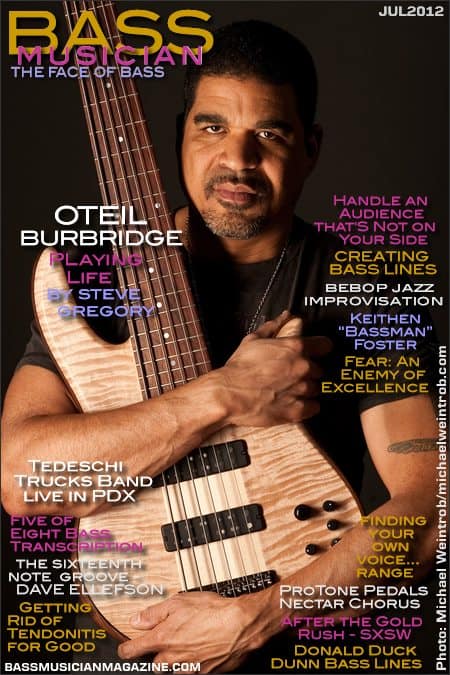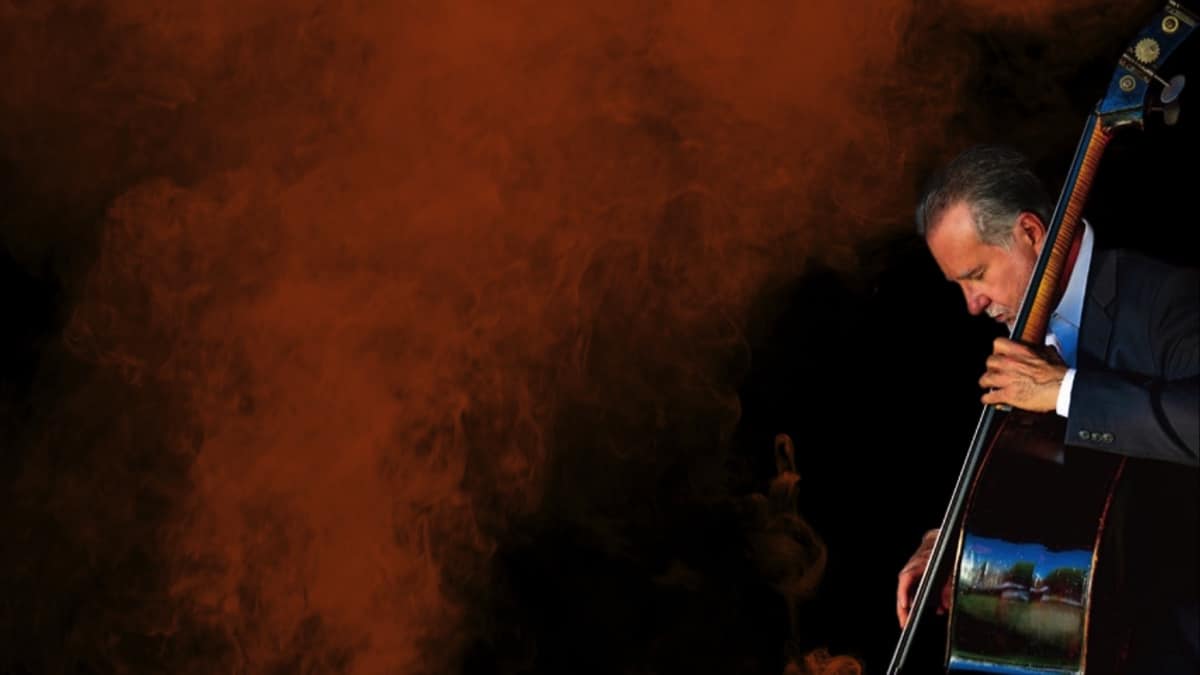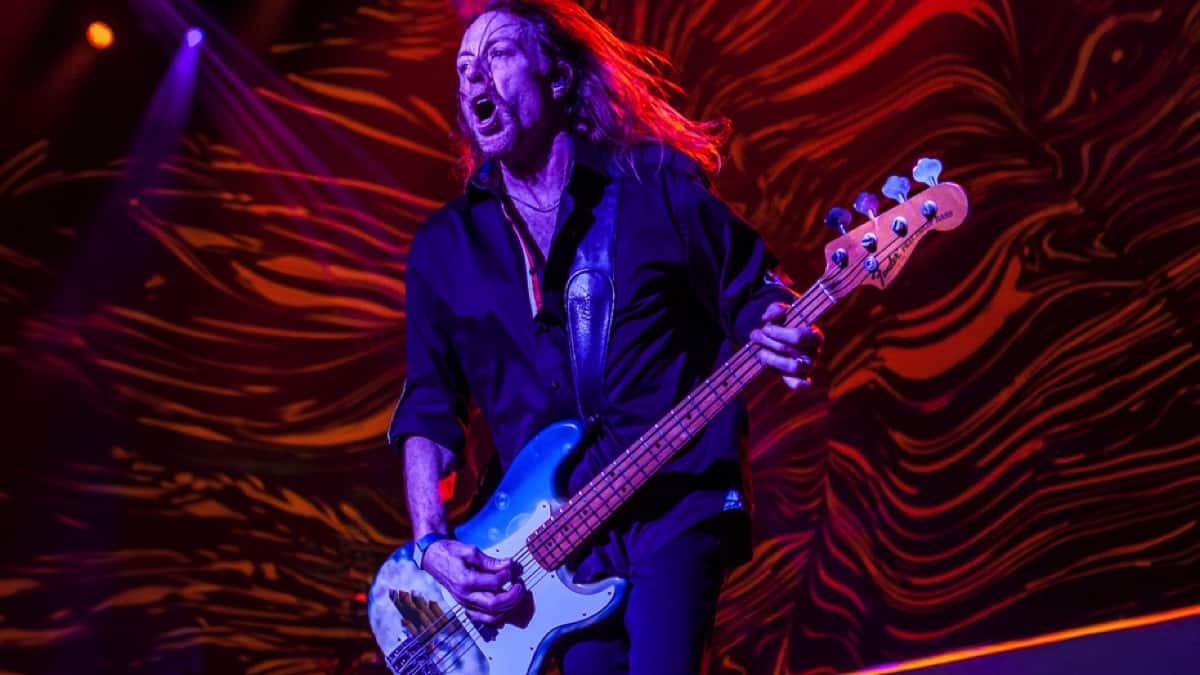Cover
Oteil Burbridge: Playing Life by Steve Gregory – Bass Musician Magazine July 2012 Issue

 Oteil Burbridge: Playing Life by Steve Gregory – Bass Musician Magazine July 2012 Issue… When Oteil Burbridge is asked about bass, bands, and songs, his responses reveal a unique perspective. Rather than focus on minutiae that would confine him, Oteil’s expansive answers are steeped in history, connection, emotion, and spirituality. Each response has a thread of Oteil’s life experience woven into it and the resulting fabric is vibrant with colors of intelligence, emotion, humor, respect, thoughtfulness, and unapologetic curiosity.
Oteil Burbridge: Playing Life by Steve Gregory – Bass Musician Magazine July 2012 Issue… When Oteil Burbridge is asked about bass, bands, and songs, his responses reveal a unique perspective. Rather than focus on minutiae that would confine him, Oteil’s expansive answers are steeped in history, connection, emotion, and spirituality. Each response has a thread of Oteil’s life experience woven into it and the resulting fabric is vibrant with colors of intelligence, emotion, humor, respect, thoughtfulness, and unapologetic curiosity.
The same threads are laced through Oteil’s playing. Once one absorbs the deep, pocketed grooves, blazing runs around the fretboard, challenging chord additions, rich harmonics, and scat-accompanied solos, it becomes apparent that Oteil is not simply playing the bass. The music, and the bass lines within it, is a means through which life is explored.
The live setting offers the listener a window into Oteil’s searching nature: a quick descending line responds to another player’s solo, as if in conversation. The bass line to Marvin Gaye’s “Inner City Blues” is briefly quoted, not only as a wink to those who recognize it, but also as a nod to the music, emotion, and history of that song’s era. Oteil’s scatting rides above solo lines and those around him can not only hear him pushing both his voice and bass to their limits, but they can feel Oteil release emotions that run the gamut from joy to sadness, playfulness to fury. Oteil is not simply playing this bass; rather, he is using the bass to share life stories.
The willingness to play with abandon and authenticity has led Oteil to some remarkable playing opportunities in his career. Great attention was first given to Oteil in 1991, when he joined Col. Bruce Hampton and The Aquarium Rescue Unit. The group exposed a diverse audience to Oteil’s dynamic playing, both through exciting live shows and two albums, “Live” and “Mirrors of Embarrassment”. Following the departure of Col. Bruce from the group, Oteil and a changing cast of band mates carried on as The Aquarium Rescue Unit and released three albums, “In A Perfect World”, “eeePee”, and “The Calling”.
In 1997, Oteil was thrust onto the worldwide stage when he filled the bass chair for the Allman Brothers Band. He was immediately accepted into the Allman Brothers Band community, who were enthralled by Oteil’s respectful, yet exploratory approach to Allman Brothers Band classics, as well as his contributions to new material. 15 years later, Oteil continues his work with the Allman Brothers Band and recently received a Grammy Lifetime Achievement award with the group.
Oteil took opportunities during breaks in the Allman Brothers Band schedule to play with on a number of side projects, including collaborations with Page McConnell, Bill Kruetzman, Gov’t Mule, and others. In 1998, Oteil formed his own band, known as The Peacemakers. Three albums, “Love of a Lifetime”, “Family Secret”, and “Believer”, were released, each highlighting Oteil’s distinctive approach to the bass.
Oteil’s most recent musical endeavor is the Tedeschi Trucks Band, led by fellow Allman Brothers Band member Derek Trucks and Trucks’ wife, Susan Tedeschi. The group, dubbed by many as a “super group” of talent, released their first album, “Revelator”, in 2011. Excitement for the group grew at a meteoric rate, igniting album sales and concert attendance. “Revelator” won a Grammy for Best Blues Album of the year and pushed the group, and Oteil, to further explore their sound. The group’s infectious songs, amazing solo spots, and electrifying shows led to a live recording, “Everybody’s Talkin’”. The album is a showcase of amazing music, which captures some of Oteil’s most innovative playing to date.
This interview found Oteil on a very short break from the current Tedeschi Trucks Band tour. With time constraints in place, it wouldn’t be unusual for an artist to give short, stock answers to interview questions; however, this is not Oteil’s manner. This opportunity was a chance to truly explore thoughts on bass, bands, and songs. In other words, an opportunity to share life.
The Tedeschi Trucks Band [TTB] is a 9-instrument group (2 drummers, 2 guitarists, keys, bass, and a 3-piece horn section) that covers a lot of sonic space. You have been able to maintain your signature style of playing – augmenting supporting grooves with melodic runs, chords, harmonics, etc. How did you approach your role in this band in order to maintain your individuality?
Actually, its 11 pieces with our two singers Mike Mattison and Mark Rivers. You know, I don’t ever think about how to maintain my individuality. I never think about how to make my speaking voice sound individual or how to make my signature look like mine on paper, it just happens by itself. Plus, most of the time people are calling me because they want what it is that I naturally do, so it’s built into the job. My main concern is usually with the song itself. “What does the song want?” is usually the question that I ask myself. Then I try to tailor what I think that is to what the band and songwriter want. In this case the band comes first, because if a songwriter that’s not in the band gives us a song I’m assuming they expect us to make it our own.
In the Tedeschi Trucks Band you are again playing with your brother Kofi (keys, flute). The interplay between you and Kofi, both on stage and on record, seems to run on a very deep level. What is it like to be playing with your brother again and how does having him on stage affect your playing?
Kofi and I didn’t get to play in a band together for like ten or eleven years. It’s funny because during the time that we finally got to a point where we were playing for lots of people, it was in separate bands. So most of the people that have heard us never heard us play together. I don’t count sit-ins. TTB is a clear example of why. If Kofi sat in with the ABB [Allman Brothers Band] or if I sat in with DTB [Derek Trucks Band] then you wouldn’t really hear it. TTB’s live album will clearly demonstrate that. To me the biggest thing is that I learned harmony from Kofi, so every line, every chord voicing, every choice of interval that I’ve ever played has been with his chord voicings in mind. Of course, most people haven’t been able to hear what’s in my head until now. I told people for years, “You’ve never really heard me play until you hear me play with Kofi.” It’s all out of context. Unless I’m playing bluegrass, delta blues, or country I can’t help but hear him in my head. Brothers have a connection that’s mystical. We take it for granted that twins will share patterns when it comes to many different things. It’s the same with brothers and music. There’s a lot less thinking going on. It has always been funny to me how Kofi and I play the same licks at the same time, but it is even more mystical to me when we screw up at the same time. Not THAT’S being connected.
The TTB has two cover tunes on the latest album, “Everybody’s Talkin”, including the title track and “Uptight” by Stevie Wonder. When you take on a cover, how important is it to maintain a piece of the original bass work and how do you make it your own?
I really don’t like doing covers that much so I don’t care about changing it. In my band (Peacemakers) we never had enough time to rehearse so I did a lot of covers to fill time. But I’d rather play something original. If it’s a cover that I love then I’m probably even more likely to change it. The key is to not think about it. I don’t want it to sound like I changed it just for the sake of changing it. Music is about emotion too, not just about being clever. I prefer natural evolution. Conversely, if there’s a true spirit of revolution I could be happy with completely changing a song. It depends what our intent is going into it. Sometimes a cover like “I’ve Got A Feeling” is just for familiarity, so I stay pretty close to the original, not counting long solo sections. So, to answer your question, the original bass part may be crucial or totally irrelevant.
You typically have a solo during a Tedeschi Trucks Band show, often only backed by drums. Do you come to the solo with a set of ideas to work through or is each night completely spontaneous?
My bass solo has gone through two major changes since I joined this band. At first I was doing all my solos on the 4 string. I had fallen back in love with the 4 string because of Aston “Family Man” Barrett and was using it on almost everything, even on my solo stuff. But I felt restricted doing my solo every night on the 4 string because I had finally had Kofi there to play all those beautiful intervals that I have been hearing, only in my head, during my solos for the last 11 years. Plus, I only get one solo a night, so I wanted it to get the most out of it. I was really glad I made the change before we played all those European jazz festivals.
Now I’m doing all my solos on the banjo bass over this African groove. I started playing banjo about 9 months ago and I’m COMPLETELY obsessed with it. I was at Merlefest hanging out with John Cowan and we heard there was a banjo bass there and went to check it out together. It’s unreal. It really reminds me of a Sintir/Guembri which is the African prototype of the bass guitar. The regular 5 string banjo sounds really African to me, but it’s not usually played in that context. Bela Fleck’s movie “Throw Down Your Heart” profoundly affected me. He goes to Africa and retraces the banjo’s origins and jams with the people of those countries. I took my banjo to Rwanda when I visited my wife there. It was heavy playing it there and watching the people respond. That’s what I’m feeling, what I’m carrying with me in my banjo bass solos.
You mentioned Family Man as an influence leading you to fall in love with the four string bass again. What about Family Man’s playing led you to “rediscover” the 4 string?
Sorry that this is kind of a roundabout story but… I was at the lowest point of my life in 1999. I was really dragging myself through the mud. I isolated myself and knew that it was the bottom. If you achieve any small amount of financial success in the arts you may find yourself with a lot of free time to play with. These can be dangerous times. Some musicians aren’t the best at using their free time wisely. It’s prime time for an addict. I may have looked fine (though I doubt it), but I wasn’t. But as bold as I am, I’m still too chicken to commit suicide. And so being stuck here, I turned to the purest things I could find in music. Funny that it wasn’t Wayne, Herbie, Jaco, Miles, or Coltrane this time. Believe me, that’s who it used to be. Bright Size Life by Pat Metheny With Jaco and Bob Moses, that was my Book of Mark. Speak Like A Child by Herbie was my Book of Matthew. Anything with Elvin Jones would do for Luke and anything with Wayne Shorter would do for John. (I guess that makes Joni Mitchell “Blue” my Letters of Paul) But no, for a real grown ass man bottom like I was having for the first time, it was Bobby Blue Bland and Family Man that I found down in the even lower depths. I thought it was Marley at first. And it was. Just like it was Coltrane with Elvin. But just like with Coltrane, I realized I was having a strong healing connection with Elvin. It was the same with Family Man. It all goes together, those two specifically were major arteries lighting my insides.
Well, that sound that Family Man gets, I started trying to get. I need a P-Bass to get it, but he does it with a Jazz. And he’s not just a bassist, he’s a composer. A master craftsman of the perfect bassline, time after time, after time. I think he’s a genius, a shaman, a conduit for God’s love and healing. Call it whatever you want. He’s IT. Just as all the great musicians are. Even when they don’t get that themselves. That’s why I also doubly admire the cats like Family Man, Bobby Blue Bland, and Elvin – for their LONGEVITY. Some realize the gift and keep on giving. To meet and hang out with Family Man, Herbie, Wayne, and Elvin on multiple occasions after what they have done for me in my darkest hours was indescribable. I also want to personally thank some of my childhood heroes, Bob Moses, Lenny White, Ralph Towner, Paul McCandless, Billy Cox, Roy Haynes, Scofield, Jerry Goodman, Vinnie, Stanley, Steve Smith, David Garibaldi, Rocco, Chuck Rainey, Randy Brecker, and Alphonso for being so nice when we met. Some times when you meet your heroes it really sucks. Not with these guys. Thank you also for honoring your gift with longevity.
In addition to playing with the Tedeschi Trucks Band, you are now in your 15th year with the Allman Brothers Band and recently received the Grammy Lifetime Achievement Award with the group. Could you tell us what is was like first joining the group and facing a catalog of well-known bass lines?
Well, it was confusing. I didn’t know their music so at first I didn’t know which songs to learn out of their (then) 28 year catalog. After getting the gig it was easier because it was narrowed down to about 40 or 50 songs. Actually, I’ll have to ask Kirk West about that. He built the Allman Brothers Museum from the ground up. He would know the exact number of songs in our rotation any given year. But at least I could pin it down at that point, regardless of the exact number. I wanted to do the original lines like Berry Oakley and Lamar Williams did, but then abandon it in the solos. Every once in a while I’ll hear the original of some song somewhere and realize that I’m playing it wrongly! After so many years of doing it you don’t realize how it morphs. But the band is rooted in improvisation so you’re trapped in the “variation/blasphemy” dichotomy. Gregg and Dickey both have asked me to change parts from the original before because they were tired of doing it the same way. In “Leave My Blues At Home”, Gregg always wanted the bass line in the verse to be in D but Berry was playing that part in B minor. Same thing really, but it always drove Gregg crazy that a different root was emphasized. Personally, I like Berry’s part better, but only because it was one of those ways that he was pushing the envelope. Gregg’s way actually feels more comfortable. I like more tension though. I like music to reflect life and life has a lot of tension. Some people like music to counteract that tension.
15 years later, what do you feel your impact on the Allman Brothers Band legacy has been?
We won’t know that till later, huh? I think someone else in the band would have to answer that question. All I can say is that the ABB is a band rooted in improvisation. That’s my bag.
You now regularly split time between your Fodera 6 string bass and your 4 string Fender. What guides you when making a decision about which bass to play in each situation?
Derek really prefers the 4 string. So do the Allman Brothers. It’s really because of them that I fell in love with the four string again. Them and Family Man! I love the past, I love the root, I love to go back to the beginning. I will probably do whole albums on a Sintir, which is covered in Camel skin! But the future is just as important. The 4 string electric bass was considered an abomination by most when it was created. Now it’s the standard. Sometimes I just want to go lower and higher than the 4 string will go. I hear things in my head that simply cannot be done on the 4 string. The notes don’t exist on the instrument. You can only have a sound in your head for so long before it demands to be realized.
What other gear are you using these days?
With the Allman Brothers Band I use Epifani Amps and Speaker Cabinets, a Fender Precision “’58” Reissue called the Road Worn, a Fodera 6 String and an Alvarez acoustic bass guitar for the ‘unplugged’ set and Dunlop guitar picks and strings (nickel, medium gauge). With TTB I use Epifani Amps and Speaker Cabinets, a ’69 Fender Precision with a Fender Jazz pick-up routed into it, another Fodera six string (thanks for making me a twin Vinnie and Joey!), Dunlop guitar picks and strings, and a Goldtone Banjo Bass. Keep it simple.
Will we be hearing more banjo bass playing from you in the future?
You bet your ass! (Sorry, I have to quote Blazing Saddles whenever possible.) I am so in love with this instrument. Jeff Mosier told me in 1988 when I lived with him that the banjo came from Africa. It was not hard to believe you know, just look at it! It’s a guitar that still manages to be a drum! He lamented back then that younger black people were not interested in it and that so many white people didn’t know of its origins. I fell in love with bluegrass when I met Col. Bruce Hampton and subsequently Matt and Mark Mundy, Jeff and Johnny Mosier, Scott Vestal and Jeff Autry. Now that I’ve moved back to Atlanta it has been really great to reconnect with all of them, although Vestal lives in Nashville. I’ve got some of the best bluegrass teachers alive to help me out. I also recently met the Carolina Chocolate Drops at a couple of festivals. I had heard them on YouTube and albums, but their live show (like ours) is way more intense. They really floored me. Meeting three black banjo players all at once was pretty cathartic! I hung out with Dom (Flemmons) and Rhiannon (Giddens) and they turned me onto the Black American banjo tradition. Dom Flemons gave me a bunch of CD’s that are totally electrifying my DNA. Now I have to learn clawhammer! Banjo is the most therapeutic thing I think I have ever found. There is something about that sound that is holy. Notice the similarity between the banjo, the Sarod (from India) and the resonator guitar. Each of those sounds was sacred to the people of their respective cultures. You know, since I started playing banjo I notice that anytime you hear it on television or in the movies it’s always to indicate stupid or trashy white people. It really pisses me off. It always makes me think of all my friends that play banjo and how they must have been feeling this way for years. Prejudice certainly is a varied and sad thing. I see Bela Fleck’s mission in a whole new light now. He’s like the champion of the Harlem Renaissance of banjo.
There is a soon to be released documentary about Col. Bruce Hampton titled, “Basically Frightened – The Musical Madness of Col. Bruce Hampton, Ret.”. Could you talk about the impact Col. Bruce had on you and how learning from him affected your playing?
I was terrified of life when I met the Col.. When I first heard “Basically Frightened” I was so relieved. I remember Bruce telling me that if I wasn’t frightened then I was an idiot. The Col. got so much joy out of observing people. I just got confused. Col. Bruce taught me to listen for a person’s life story in their music. That’s not the way I learned. I was encouraged by my dad to focus more on the “science” of music. I don’t want to make it seem like he didn’t care about the emotional part, but he was a product of the Harlem Renaissance. During a time when blacks were portrayed as being unable to match whites in intelligence, the emphasis was on science, intellect. The emotional part of the music came through the horrible experience that blacks were having in this country and was inevitable. And it was part of the black tradition and so was destined to come through anyway. But my dad wasn’t really into Delta blues. I think it reminded him too much of slavery and didn’t seem intelligent enough for his tastes. I carried that bias by default. Fortunately Col. Bruce helped me see what was so great about delta blues and bluegrass. It plugged me into folk music. This then helped me understand country music (thank you Warren Haynes) and all this black banjo and string music that Dom just turned me onto. I never would have understood what was so great about these incredible gifts.
I was hanging with some fusion cats and I played them some older bluegrass. They commented that they would have liked it more if they used some “higher harmonies”. I thought to myself, “That’s not their story. They’re coal miners and farmers, not conservatory students.” They missed the point. They would probably miss the point with Howlin’ Wolf too. Now I hear conservatory students and if they haven’t progressed beyond that, then here’s what I get out of their music: This guy sat in a room in the heart of academia and practiced all day and night. Why can I hear so much more of the “un-schooled” musician’s life experience in their music? I want to hear when you’re dog died (or your child), when you embarrassed yourself, when you’re being funny, at peace, angry. I even want to hear gross things like the musical equivalent of your water breaking, or vomiting. Bruce was real big on vomit. Vomit and diarrhea are facts of life and I want to hear the whole thing. At a certain point in my musical journey I was trying to communicate things that no chord or scale could accurately reflect. Recently we’ve been doing a lot more “vomiting” in the Tedeschi Trucks Band live shows, especially on Kebbi Williams’ solos. Don’t be fooled though, Derek will vomit in a heartbeat. Susan can’t help it. That’s the truest kind: completely involuntary!
You know, I believe you can watch Coltrane go through this evolution. At a certain stage when he was really zeroing in on the spiritual path the freedom he was reaching was reflected in his music. His playing could no longer necessarily be confined by any boundaries 100% of the time. A lot of his fans interpreted this as an intellectual decision to “experiment with the avant garde”. I believe this is mistaken. I believe he was shouting with joy of newfound spiritual freedom, wailing in despair of war, “speaking in tongues”, protesting social injustice and celebrating social victories, among other things. I believe his music was a mirror, as all of ours is, for better or worse. And whether we even realize it or not. Listen to Cedell Davis and you will know what I’m talking about. He’s like a prism that reflects the total spectrum from heaven to hell and beyond.
I want to hear a human journey, not a “musical presentation”. The day I heard Howlin’ Wolf, I mean really heard him, was like being born again. It’s happening again to me right now with the banjo. I just got the Earl Scruggs tab book and there’s a CD that comes with it. Hearing him talk is just like listening to a Howlin’ Wolf interview. I love to hear him talk as much as I love to hear him play. You get more of his story. You can’t separate the two. Actually you can but that would be a mistake.
What projects do you have coming up?
Well I’m still working on my solo record 5 years later. I wanna play on Kofi’s solo project too. There’s gonna be a banjo project coming up ‘Fight Fire with Far’, but I need a few years before I’ll be ready for that. Honestly, I want to be a good husband and (hopefully) father and that’s the most important thing coming up in my life. Music is fun, its a great job, its therapy, its many things, but its also just running your hands over a piece of wood too. That’s one thing that the Col. taught me that I’ll never forget. It keeps my ego in check.
On the web:
Tedeschi Trucks Band http://www.tedeschitrucksband.com
Allman Brothers Band http://www.allmanbrothersband.com
Bass Videos
Brian Bromberg, Paying Tribute to Scott LaFaro – April 2024

Brian Bromberg, Paying Tribute to Scott LaFaro, April 2024…

Brian Bromberg is one heavy-hitting bass player and I am in awe of his talent as one of the few individuals who is equally proficient on electric and upright bass.
You might remember our conversation back in 2018 when he released his powerhouse Funk album. Brian’s “A Little Driving Music” album is a staple on all our road trips and his Jaco and Jimi Hendrix tribute albums are mind-blowing… and I could go on and on.
Now, Brian has taken on the arduous task of producing an album paying tribute to the late, great, Scott LaFaro. He teamed up with pianist Tom Zink and drummer Charles Ruggiero and Brian delivers a commanding performance on upright. The entire album is a masterpiece and a real treat to listen to track after track.
Join us as Brian shares the details behind this project and more.
Photo, Michel Bocandé
Featured Videos
Visit Online
brianbromberg.net
FB @BrianBrombergBassist
YouTube
Cover
Leland Sklar, Over Half a Century of Bass, March 2024

We all have enjoyed Leland Sklar’s Bass lines for over half a century.

You might remember that we had him on our cover back in 2017 and did an update when he launched his book “Everybody Loves Me” in 2020. It was exciting to hear that The Immediate Family had got back together in the studio to work on their own music in 2019 and are now up to two albums.
Just last December, Magnolia Pictures released a documentary titled “Immediate Family” where we got a behind-the-scenes look at the massive contributions Danny Kortchmar, Waddy Wachtel, Ross Kunckle, Leland Sklar and Steve Postell have made in countless songs that are the very essence of our daily personal musical soundtracks. Seeing the astronomical roster of performers they have supported over many years is very eye-opening. It is a must-see for any music lover!
Now, I am thrilled to bring you a special chat with Leland Sklar where we go more in-depth into the bass side of his musical journey.
Photos: Header, Rob Shanahan – Cover Photo, Jay Gilbert/Chris Schmitt
Featured Videos:
Skin In the Game – https://www.youtube.com/watch?v=QhbnzIrdjJ8
from new album Skin In The Game
The Toughest Girl In Town – https://www.youtube.com/watch?v=UVQLZIRfLjU
from new album Skin In The Game
Fair Warning – https://www.youtube.com/watch?v=1DN18DYwLsU –
from the self-titled album The Immediate Family
Visit Online
www.immediatefamilyband.com/
www.facebook.com/TheImmedFamily
www.instagram.com/theimmedfamily/
Bass Videos
Ricky Phillips, STYX Bass And More – February 2024

Ricky Phillips, STYX Bass And More…

I have always been a huge Styx fan. Their music kept me awake during countless nights studying and gave my imagination a place to escape when I had a moment to take a break.
I had the immense opportunity to chat with STYX bassist Ricky Phillips for our August Cover in 2017 and follow his projects as time passed. Now, I am thrilled to have the opportunity to catch up with Ricky as he has been super-busy over the past six years.
Join me as we take a deep dive into the band’s most recent album “Crash the Crown” and EP “The Same Stardust”. Ricky shares some insights into the herculean team effort behind the scenes and the musical process that keeps them ever so busy and how he has updated his sound.
Without further ado… Here is Ricky Phillips!
Photo: Jason Powell
Featured Videos:
“Crash of the Crown” lyric video
“Reveries” lyric video
“Save Us From Ourselves” lyric video
“Sound the Alarm” lyric video
“Too Much Time On My Hands” Zoom video 2020
Visit online:
www.Styxworld.com
FB & IG @styxtheband
Bass Videos
Jeff Pilson, Foreigner Low End – January 2024

Jeff Pilson, Foreigner Low End – January 2024…

Those of us who were around back in the 70’s remember how certain songs on the radio resonated with us. It turns out that many of these iconic melodies came from Foreigner and they were part of our personal soundtracks!
After all these years, the band is going as strong as ever with Jeff Pilson firing away on bass midstream into a 2-year farewell tour.
I am excited to be able to bring you all the details about Jeff’s musical Journey, the farewell tour in progress, how he gets his sound and his plans for the future.
Cover Photo: Krishta Abruzziini / Video Photos: Krishta Abruzzini, Karsten Staiger, Gina Hyams
Featured Videos
For more news on FOREIGNER and upcoming Farewell Tour dates, fans can visit:
foreigneronline.com
facebook.com/Foreigner
twitter.com/ForeignerMusic
instagram.com/foreignerlive
youtube.com/user/FWebTeam
Also on FB @officialjeffpilson
Bass Videos
Rodney O’Quinn, Rockin’ Hard Through the Years – December 2023

Interview With Foghat Bassist Rodney O’Quinn…

Many rock fans have enjoyed music by Foghat, who originally formed in London back in 1971.
Over the many decades of playing, the band members have changed, leaving behind only Roger Earl as the only original member. Bassist Rodney O’Quinn left the Pat Travers Band and joined the group in 2015 and has been laying down the low end for this iconic quartet keeping the Foghat legacy alive. With a new album titled “Sonic Mojo” which dropped on November 10th, the band is as busy as ever and there is lots of very tasty music to come.
Join me as we learn of Rodney O’Quinn’s musical journey, how he gets his sound, and his plans for the future.
Photos:
Cover, Jake Coughlin
Video Thumbnail, Tom Apathy
Photos used in the video: Kerry Quinn, Chuck Lanza, Kim Granger, Kenneth Strohm, Jake Coughlin, Jay Jylika
Featured Videos:
1st Single from Sonic Mojo – Official “Drivin’ On”
2nd Single from Sonic Mojo – “She’s a Little Bit of Everything Official Video
“Road Fever”- California Mid State Fair – Paso Robles, CA – 7-27-22
“Stone Blue” – Rodney O’Quinn Bass/Lead Vocals – Don Odell’s Legends – Woonsocket, R.I – 10/15/22 – The Stadium Theater
The Earl’s Court – Season 2, Episode 7: Funny Guys
“I Just Want to Make Love to You” – CasinoRama – 6-9-23
FOGHAT “Somebody’s Been Sleepin’ in My Bed” – Mohegan Sun, Uncasville, CT – 1/28/22
“I Just Want to Make Love to You” – California Mid State Fair – Paso Robles, CA – 7-27-22
Visit Online:
www.foghat.com
www.facebook.com/Foghat
www.twitter.com/FOGHAT
www.instagram.com/foghat_official
www.youtube.com/user/FOGHATMUSIC



















